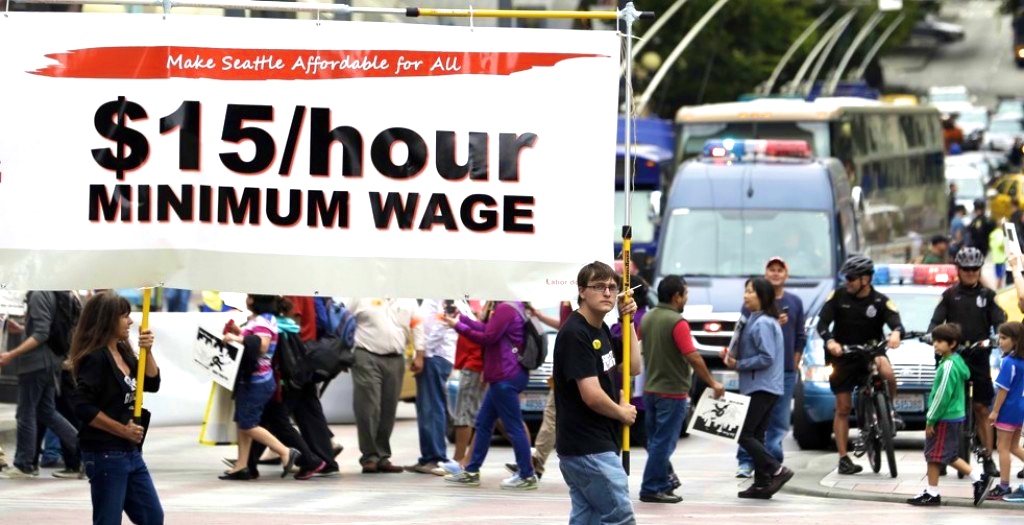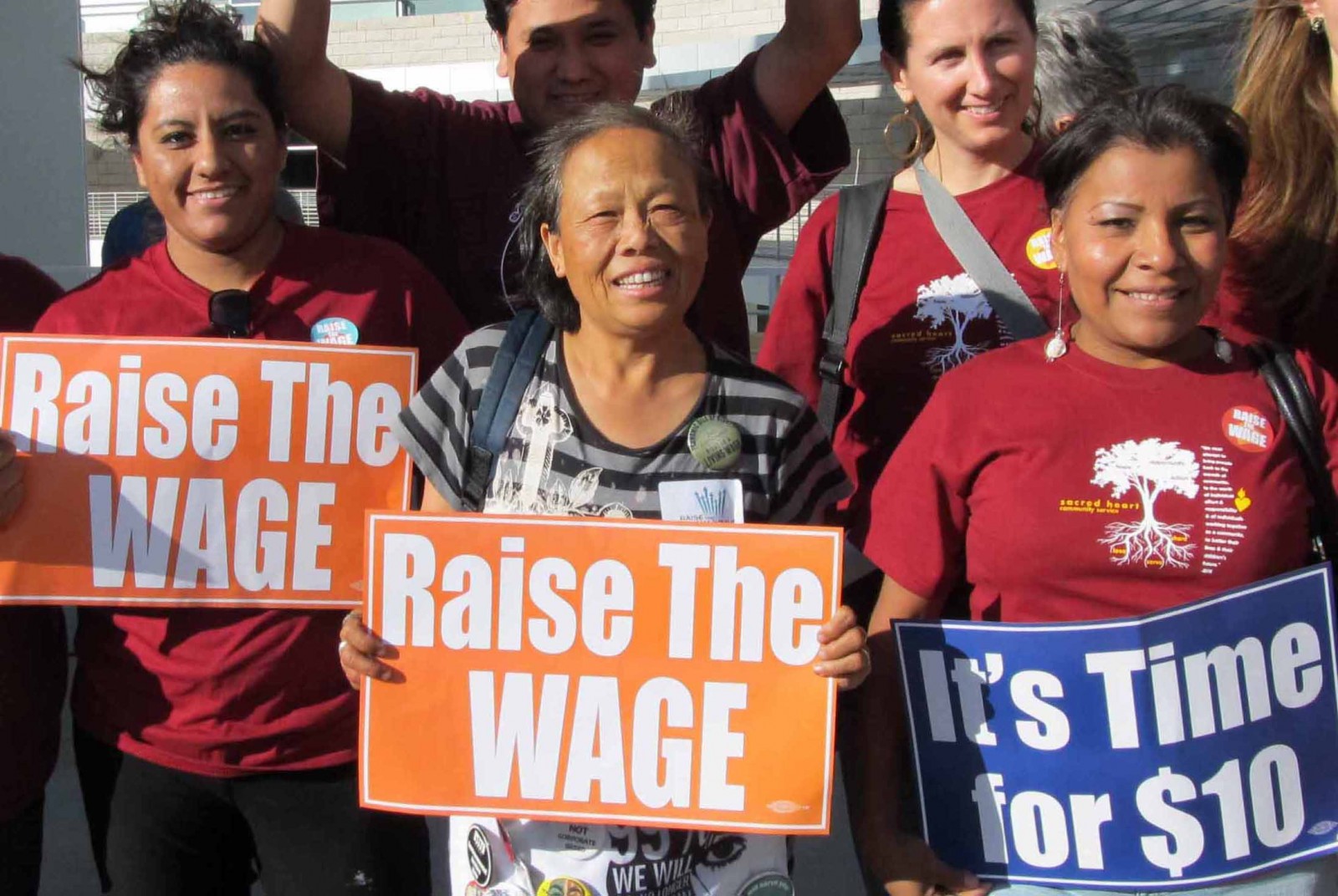
The fight over raising the minimum wage will be one of the defining battles for the 2014 elections. As the floor – the minimum wage – falls out from under Americans, big majorities of voters in both parties want the minimum wage raised. President Obama and congressional Democrats support an increase to $10.10, indexed to inflation. Republicans and plutocrats want to obstruct this.
When the public can vote on minimum wage increases, they pass handily. What does this mean for 2014?
Rigged System
Here is just one example of how the rigged, post-Reagan/Bush/Bush plutocratic America works now: The six Walton heirs have more wealth than 33 to 40 percent of all Americans combined. (The figures vary from report to report.) The more money Walmart makes, the more wealth these six people have, compared to between 90 million to 125 million people. And the share of those six increases every year while those many millions fall behind.
One big reason so many people are falling behind is because the floor is falling out from under them. That floor – the minimum wage – is not indexed to inflation (or productivity) so it gets lower every year. The game is rigged by extremely wealthy business owners who benefit from low wages and pay members of Congress to obstruct efforts to raise it. (Example from last March: House Republicans Unanimously Vote Down Minimum Wage Increase.)
So here is another part of the rigged game: Taxpayers cover part of the living costs of low-wage workers, so their employers can pay themselves more. People with very low incomes get food stamps, Medicaid, the Earned Income Tax Credit and other forms of support to help them get by. As inflation rises, the purchasing power of the minimum wage falls, and more people qualify for assistance from the taxpayers. So companies like Walmart can pay even less in real terms – and thereby shift even more money up from working people and taxpayers to the top few.
And, of course, as the top few get even more wealth from this rigged game, they have even more power and influence to pay off legislators to rig the system even more in their favor and against the rest of us.
Minimum Wage Facts
If the minimum wage had increased with inflation in the last 40 years it would be $10.74. But it is only $7.25. (For tipped employees it is only $2.13.)
If the 1968 minimum wage had increased with productivity, it would be over $16.60 an hour today. More than 40 percent of Americans make less than $16.50 an hour today. No wonder people are feeling a squeeze!
People cannot live on $7.25 an hour. The National Low Income Housing Coalition looked at how many hours minimum-wage employees have to work per week in each state just to rent an apartment and still be able to survive. (See this chart.) West Virginia was lowest at 63 hours. Hawaii was 175 hours. California, Maryland, New Jersey, New York and Washington, D.C. were all over 130 hours.
Raising the federal minimum wage means all businesses must do the same thing at the same time, so no business gains an advantage over other businesses. Businesses can choose how to cover any added costs. Some might raise prices (but price increases would be minimal in any case), others might pay top executives a bit less, still others would dip into some of the excess cash that would otherwise be used for stock buybacks. (The ones that raise prices so top executives can retain extreme pay levels will be at a disadvantage if their competitors keep prices where they are.)
Raising wages does not “cost jobs.” Study after study shows that the increased purchasing power of low-wage workers increases demand, which increases hiring enough to more than offset any job loss that might occur. But businesses don’t tend to have a lot of employees around that they don’t absolutely need, so a wage increase is not a reason to lay people off.
Raising the minimum wage would cut “safety-net program costs” by lifting people up so fewer of them need assistance.
What The Public Wants
People “get it,” so pressure is building. Here are some recent poll results:
63%: A December 11 Wall Street Journal/NBC News poll found that 63 percent supported a rise to $10.10. “Support for the $10.10 rate was broad, including 61 percent of those earning $75,000 or more and 68 percent of those earning $30,000 or less. The survey found 77 percent of Democrats supported that rate, as did 47 percent of Republicans.”
76%: A November Gallup poll showed that 76 percent of Americans want the minimum wage raised to at least $9 from the current $7.25. This is up 5 percentage points just since March.
80%: An August poll commissioned by the National Employment Law Project (NELP) Action Fund found that 80 percent support raising the minimum wage to $10.10, including 62 percent of Republicans and 75 percent of southern whites.
71%: A March poll by the USA Today/Pew Research Center found that 71 percent favor increasing the minimum wage to $9.
Election-Tested
These are big numbers and they have been tested in elections.
In New Jersey voters approved by 61 percent to 39 percent an increase to $8.25 with an index to inflation — by the same voters that re-elected Republican Chris Christie as governor.
In SeaTac, Washington, outside of Seattle, voters narrowly approved a $15 minimum wage, the highest in the country, in the face of a fierce fight by business groups.
Even two-thirds of small business owners support a minimum wage increase. An April poll of small business owners, conducted March 4-10 by Greenberg Quinlan Rosner Research, found more than two-thirds of entrepreneurs support increasing the federal minimum wage of $7.25 an hour and adjusting it annually to keep up with the cost of inflation. “Additionally, of the small business owners polled, which were predominantly Republican (46 percent identified as Republican, 35 percent as Democrat and 11 percent as independent), a sweeping 85 percent already pay all of their employees more than the federal minimum wage.”
Furthermore, nearly two-thirds “agree increasing the minimum wage would help decrease pressure on taxpayer-financed government assistance that’s needed to make up for low wages.”
The Coming Push To Raise The Minimum Wage
In the new year there will be a legislative push to raise the minimum wage to $10.10 and index it to inflation so it keeps up with at least that low level from now on. In Congress the vehicle will be the Fair Minimum Wage Act, sponsored by Rep. George Miller, D-Calif., and Sen. Tom Harkin, D-Iowa. President Obama has endorsed the proposal.
A coalition led by National Employment Law Center (NELP) will be working hard to get the minimum wage law passed. Other partners in coalition or otherwise working to lift the minimum wage include: Raise the Minimum Wage, Economic Policy Institute, Restaurant Opportunities Centers United, Interfaith Worker Justice, Progressive States Network, National Women’s Law Center, Business for a Fair Minimum Wage, and Let Justice Roll.
Republicans will certainly try to obstruct the bill. But many local and state ballot measures will be moved onto the ballot to increase turnout.
So there is a steamroller coming. Republicans have to decide: Will they allow this increase to happen or will they try to obstruct it and run in 2014 as opponents of fair pay for working people?
3 WAYS TO SHOW YOUR SUPPORT
- Log in to post comments













